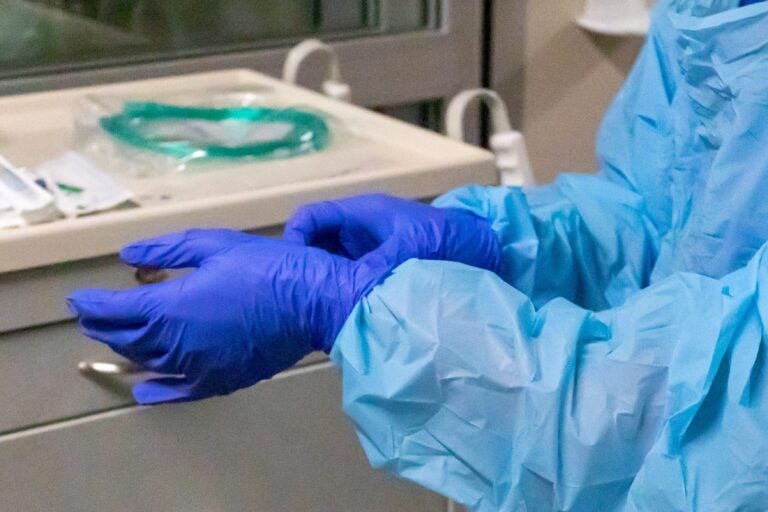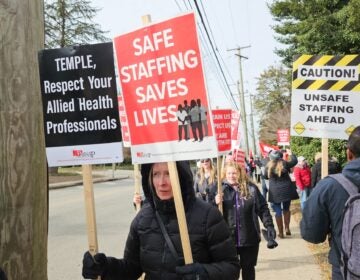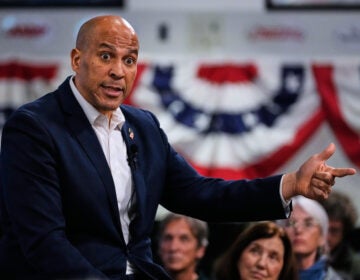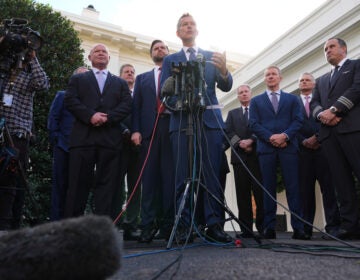Shapiro visits Temple Health to promote budget proposals to tackle nurse shortage
The governor’s plan tackles the growing nursing shortage by paying students part of their tuition back if they stay in Pennsylvania to work.
Listen 1:10
A nurse adjusts her gloves in a hospital in 2021. (Mike Zacchino/KDRV via AP, Pool)
From Philly and the Pa. suburbs to South Jersey and Delaware, what would you like WHYY News to cover? Let us know!
Gov. Josh Shapiro visited Temple University this week where he promoted his $5 million program to address Pennsylvania’s nursing shortage. The initiative, aimed at bolstering the state’s healthcare workforce through tuition assistance and hospital partnerships, is part of the governor’s 2025-26 budget.
The Nurse Shortage Assistance Program would provide funding to hospitals that collaborate with nursing schools, helping cover tuition costs for students who commit to working in Pennsylvania hospitals for at least three years after graduation. The goal, state officials say, is to increase nurse retention and expand the “pipeline” of professionals entering the field.
“We need to take action now to address Pennsylvania’s nursing shortage, and my budget makes strategic investments to do just that,” Shapiro said. “By expanding education programs, providing tuition assistance and strengthening workforce pipelines, we can ensure hospitals have the skilled professionals they need to deliver high-quality patient care.”
The proposal comes as hospitals across the state report staffing challenges. A recent survey by the Hospital and Healthsystem Association of Pennsylvania found that 14% of nursing positions remain unfilled. The shortage is projected to grow, with an estimated 20,000 additional nurses needed in the state by 2026.
Shapiro was joined at the event by Nancy Walker, secretary of the Pennsylvania Department of Labor & Industry, who said the effort is coming “at a crucial time.”
“This is really a crisis right now,” Walker said. “We have an aging population in Pennsylvania, so these numbers are just going to continue to go up over the next 10 years.”
The nursing shortage in Pennsylvania reflects a broader national trend. The National Council of State Boards of Nursing projects that 900,000 nurses, or about one-fifth of the registered nurses in the U.S., intend to leave the workforce by 2027. The U.S. Bureau of Labor Statistics estimates that jobs in the field will additionally increase by that number over the next 10 years, as well.
The governor’s plan appears to build on existing efforts at schools like Temple Health, which launched their Nurse Scholar Program last year. That initiative offers students up to $40,000 in tuition assistance in exchange for a two- to three-year commitment to work at Temple Health after graduation. To date, the program has received nearly 200 applications from students at 18 partner schools.
Maura Cabry, a participant in that program, called it “life-changing.”
“It has not only given me the opportunity to pursue a career I am passionate about but has also provided me with financial peace of mind,” she said.
The governor’s healthcare-related proposals also include funding to support physicians, dentists and psychologists who work in underserved areas. The plan would allocate an additional $5 million to Pennsylvania’s Primary Care Loan Repayment Program, which provides financial incentives for medical professionals to practice in communities with limited access to healthcare. Another $10 million is earmarked for behavioral health loan repayment programs, aiming to address shortages in mental health care providers across the state.
Legislation is also being proposed to grant full practice authority to nurse practitioners, allowing them to work without physician supervision. Proponents argue that removing this restriction would improve healthcare access, particularly in rural areas where primary care providers are scarce.
Shapiro’s budget recommendations are expected to face scrutiny in the Republican-controlled state Senate, where past healthcare workforce initiatives have received bipartisan support but also raised concerns about funding and long-term sustainability. Republicans have criticized the governor’s latest proposal, which would increase the overall budget by nearly 10% over last fiscal year and hit a record of $51.5 billion in spending.
“You can have the greatest proposals in the world from top to bottom, and every line item could be something that we all support but if you don’t have the money sustainable in the future, it’s not going to work,” Pennsylvania House Republican Leader Rep. Jesse Topper said. “The number one thing that we’re saying is we have to have policies that grow the economy.”
At Temple, the governor also responded to suggested cuts in federal funding that could severely cut Medicaid funds allocated for the state. A Congressional budget resolution passed last week calls for $2 trillion in spending cuts, $880 billion of which would come from the House Energy and Commerce Committee, which oversees Medicaid. The Congressional Budget Office estimates that those cuts would not be possible without cutting Medicaid, which more than 3 million Pennsylvania residents rely on for healthcare coverage.
“I’m hopeful that the Congress of the United States will actually listen to people who have been rising up and speaking up about how devastating these cuts would be,” Shapiro said. “It would kill a hospital like Temple.”

Get daily updates from WHYY News!
WHYY is your source for fact-based, in-depth journalism and information. As a nonprofit organization, we rely on financial support from readers like you. Please give today.






